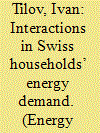| Srl | Item |
| 1 |
ID:
132636


|
|
|
|
|
| Publication |
2014.
|
| Summary/Abstract |
In recent years, sustainability has represented one of the most important policy goals explored in the environmental Kuznets curve (EKC) literature. But related hypotheses, performance measures and results continue to present a challenge. The present paper contributes to this ongoing literature by studying two different EKC specifications for 10 Middle East and North African (MENA) countries over the period 1990-2010 using panel data methods. For the first specification, namely EKC, we show that there is an inverted U-shape relationship between environmental degradation and income; while for the second specification, namely modified EKC (MEKC), we show that there is an inverted U-shape relationship between sustainability and human development (HD). The relationships are shaped by other factors such as energy, trade, manufacture added value and the role of law. More interestingly, findings from the estimation show that EKC hypothesis, HD and sustainability are crucial to build effective environmental policies.
|
|
|
|
|
|
|
|
|
|
|
|
|
|
|
|
| 2 |
ID:
166346


|
|
|
|
|
| Summary/Abstract |
This article analyzes the interactions and possible trade-offs between direct energy consumption and embodied energy requirement of households in Switzerland in order to assess the net impacts of standard energy policies focusing exclusively on direct energy use. Direct and embodied energy demand of Swiss households are estimated by combining consumption data of a national expenditure survey with data on energy intensity from life-cycle analysis. Using a system of equations and an instrumental variable approach, we find that both domains are driven by same determinants, but that there is no evidence for significant substitution between them. We also find an increasing effect of income on both domains, with particularly important effects on embodied energy. From a policy perspective, our findings highlight a concern that economic growth could bring about an increasing global energy demand through energy requirement for non-energy commodities. However, the wide-spread policies targeting direct energy are unlikely to cause a substantial shift in household consumption to embodied energy.
|
|
|
|
|
|
|
|
|
|
|
|
|
|
|
|